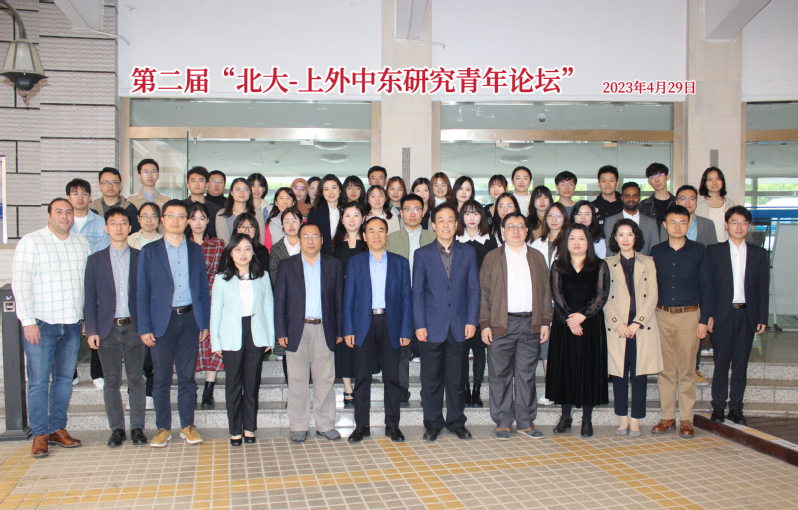
In order to further strengthen academic exchanges and collaborative cooperation among domestic Middle East research institutions, promote the construction of an academic community for Middle East studies, and build an exchange platform for young scholars, the 2nd Peking University- Shanghai International Studies University Youth Forum on Middle East Studies, jointly organized by the Middle East Studies Institute of Shanghai International Studies University, the School of Foreign Languages of Peking University, and the Center for Middle East Studies of Peking University, was held on April 29, 2023 at Shanghai International Studies University. The theme of this year's forum was The Middle East and Middle East Issues in a Changing World, and nearly 50 experts on the Middle East, young scholars and graduate students from the two universities attended the forum.
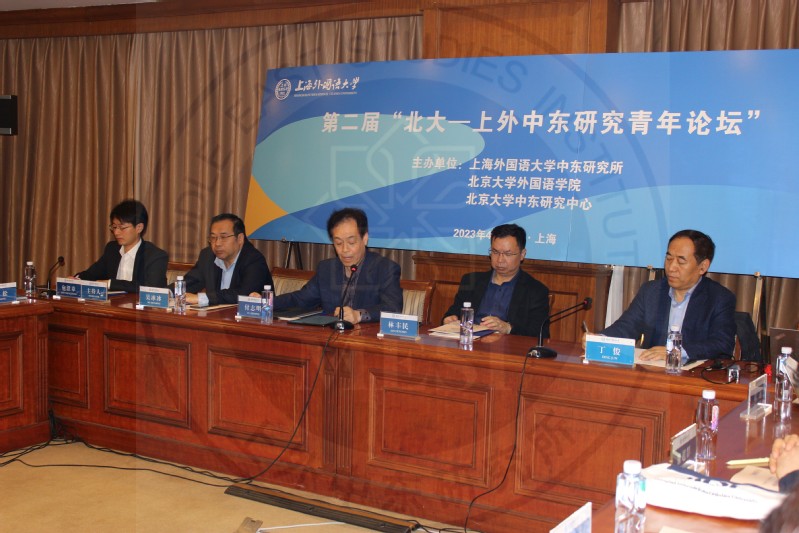
At the opening ceremony of the forum held in the morning of the 29th, Professor Ding Jun, Director of the Middle East Studies Institute of Shanghai International Studies University, and Professor Fu Zhiming, Vice Dean of the School of Foreign Languages of Peking University, delivered speeches one after another.
Professor Ding Jun introduced the history, discipline construction, academic platform and talent cultivation of the Middle East Studies Institute of Shanghai International Studies University, and thanked Peking University colleagues for their long-term support to the construction of Middle East studies and Arabic studies at Shanghai International Studies University. The Peking University- Shanghai International Studies University Youth Forum on Middle East Studies aims to implement the institutionalized cooperation between the Middle East studies institutions of both universities, and to build an academic platform for promoting the construction of an academic community of Middle East studies, cultivating new scholars, and building an autonomous knowledge system of Middle East studies in China.
Professor Fu Zhiming emphasized that Peking University and Shanghai International Studies University have established a long tradition of cooperation in the field of Middle East studies and Arabic education, and the former scholars, represented by Mr. Ma Jian, have taken the lead in promoting Sino-Arab cultural exchanges and mutual knowledge, It is expected that this forum will make unique contribution to the continuation of academic tradition, broadening of academic vision and innovation of research theory.
After the opening ceremony, the seminar was held in the form of sub-forums, in which 19 young scholars and postgraduates from the two institutions made speeches.
The first session on New Developments in the Middle East Regional Order and Hotspot Issues was chaired by Associate Researcher Bao Chengzhang from the Middle East Studies Institute of Shanghai International Studies University, and five postgraduate students delivered speeches.
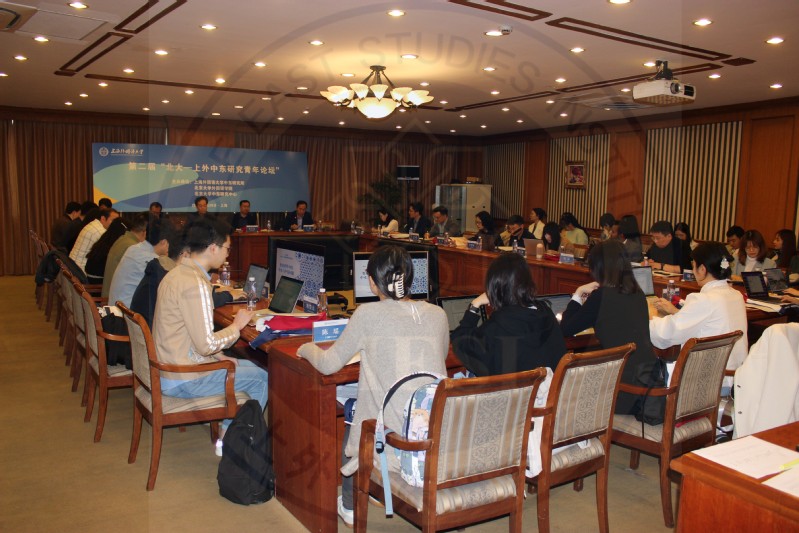
Li Xueyan, a doctoral student of the Middle East Studies Institute of Shanghai International Studies University, gave a presentation titled Between the Fields: An Exploration of Strategic Autonomy in the Middle East. Taking the strategic autonomy of US-Middle East relations as the field, she sorted out the construction and application of strategic autonomy in the Middle East, pointing out that the Middle East strategic autonomy has characteristics such as spontaneity and regulation. As a result, the Middle East tends to be confrontational and competitive in a relatively closed field, and more cautious and cooperative in an open system. At the current stage, the situation in the Middle East has undergone significant changes, and the competitive dynamics of extraterritorial powers in the Middle East has shifted from historical control to competition and struggle for Middle Eastern countries, and the strategic autonomy and flexibility of Middle Eastern countries have increased.
Zhang Ruofeng, a PhD candidate at the School of Foreign Languages, Peking University, spoke on the topic of UAE's Africa Policy. According to her, the UAE is deeply involved in political, economic and security affairs in Africa through the deployment of military bases, trade and investment, diplomacy and foreign aid. Since the Arab Spring, the focus of the UAE's policy towards Africa has shifted from commercial interests and food security to political, military and security interests and geostrategic competition.
Tang Tanqi, a PhD candidate of the Middle East Studies Institute of Shanghai International Studies University, spoke on Fragmented Identity, Geopower Vacuum and Proxy Wars in the Middle East since the Arab Spring. He argued that the frequent occurrence of proxy wars in the Middle East is the result of the interaction of regional, international and domestic variables. Since the Arab Spring, the Middle East has become more pluralistic, fragmented, and confrontational in its identity. It is difficult to establish central governments in volatile countries in the region, and the lack of domestic political power centers makes it difficult to integrate resources and reset policies. The shifting strategic focus of extra-territorial powers has provided space for power penetration by intra-territorial powers. Too many sources of exclusive identity within the region lead to an increased tendency of centrifugation. The geopower intra-domestic powers have ambitions to expand their own identities or influence, leading to increased external intervention.
Lu Bichun, a PhD candidate at the School of Foreign Languages, Peking University, titled her presentation A Study of Turkey's Policies and Practices on the Syrian Kurdish Question. She pointed out that Turkey's policy and practice towards the Syrian Kurdish issue is highly linked to the domestic Kurdish issue in Turkey, driven by domestic political interests as well as the influence of bilateral relations between the U.S., Russia and other major powers and Turkey. On the Syrian Kurdish issue, the Turkish government, with the basic goal of limiting the development of Kurdish nationalism in the region and combating Kurdish forces, maintains consultations and contacts with the U.S., Russia, and the Syrian government based on its own political interests, thereby increasing Turkey's regional influence.
Zhou Yu, a Sudanese doctoral student of the Middle East Studies Institute of Shanghai International Studies University, spoke on Current Armed Conflict in Sudan and Sudanese Party Politics. He argued that the analysis of the causes of the current armed conflict in Sudan needs to focus on three aspects: first, the transformation of the role and function of the Rapid Support Forces (RSF) from a militia organization to an important part of the Sudanese Armed Forces (SAF); second, the political position of Sudanese political parties during the transitional period, the political process, the framework agreement and the way to deal with the relationship between the RSF and SAF; third, the solution of Sudanese political parties to the current internal armed conflict How to influence the future Sudanese political process.
In the critique session, Assistant Professor Li Haipeng from the Arabic Department of the School of Foreign Languages of Peking University commented on the above presentations in four aspects: research path, concept interpretation, case selection, and research content, and made specific suggestions on how to focus on the research topic, improve the argument design, and realize the combination of theoretical discussion and empirical research.
The first sub-forum, A Multidimensional Examination of Transformation and Reform in the Middle East, was moderated by Lian Chaoqun, Associate Professor and Deputy Head of the Department of Arabic at the School of Foreign Languages, Peking University, and five young scholars spoke successively.
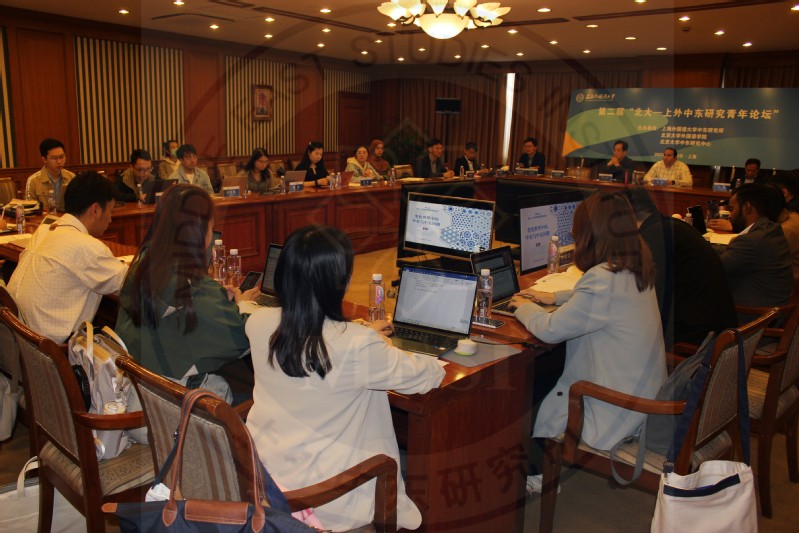
Li Zhihao, a PhD candidate of the Middle East Studies Institute of Shanghai International Studies University, titled his presentation The UAE's Economic Diversification Transformation in the Perspective of Regime Legitimacy Construction. He pointed out that regime legitimacy includes ideological basis, institutional rule basis and effectiveness basis, which correspond to legitimacy, normativity and government performance respectively. Since its establishment, the UAE has maintained a high degree of stability in its ideology and institutional rules. In terms of ideology, the UAE attaches importance to historical and traditional conservative political principles and adheres to moderate Islamic beliefs and tolerant religious policies; in terms of institutional rules, the UAE established a federal system through the formulation of a constitution, which clarifies the rights and obligations of the federal government and the emirates, so that the continuity of the country's political structure is free from controversy; in terms of government performance, the UAE has continued to strengthen the regime through economic transformation In terms of government performance, the UAE has continued to strengthen the foundations of regime effectiveness through economic transformation.
Ou Junliang, a master's student at the School of Foreign Languages, Peking University, spoke on the topic of Analyzing the Impact of Kuwaiti Parliamentary Politics on Economic Diversification Reforms. He explained the impact of Kuwaiti parliamentary politics on economic diversification and its root causes and mechanisms, pointing out that the main concern of the Kuwaiti National Assembly is to create national wealth and monitor its distribution to make it more in line with the public interest rather than the interests of the elite. The government-parliament game has constrained the transformation process of economic diversification in Kuwait, and the government-chamber dispute may lead to the slow progress of the Vision 2035 with economic diversification reform as the core objective, or even the possibility of being shelved and reduced to a dead letter. The possibility of the 2035 Vision being relegated to a mere paper.
Chen Yao, a doctoral student of the Middle East Studies Institute of Shanghai International Studies University, gave a speech titled An Analysis of Security Sector Reform in Afghanistan (2001-2021) and Hybrid Security Governance. She pointed out that since the outbreak of the war in Afghanistan in 2001, the uneven reform process under the multilateral structure of donors, the lack of a peaceful and stable security environment, and internal corruption have led to the slow professionalization of the Afghan security sector, while the deep-rooted tribal social structure has seriously weakened the cohesion of the security forces and their loyalty to the government. After attempts to build a Weberian state were limited, Afghanistan quickly returned to a hybrid security governance model in which the state and non-state armed groups jointly provide security products, which seriously hinders the spread of central government authority in rural areas.
Yu Binqiang, a doctoral student of the Middle East Studies Institute of Shanghai International Studies University, spoke on Retribalization in Libya's political development. He argued that during the Qaddafi period, Libyan politics went through a top-down change from de-tribalization to reliance on specific tribes to consolidate ruling power. After the outbreak of the Libyan civil war, due to the lack of a strong central power restraint, the phenomenon of re-tribalization emerged in Libyan politics from the bottom up, prominently manifested in the pursuit of autonomy around the exclusive interests of the tribe, support for competing parallel governments, and even tribal initiatives for external interaction with neighboring countries, eventually leading to the proliferation of state Separatism has proliferated.
Kong Que, a postdoctoral fellow at the School of Foreign Languages, Peking University, spoke on The Political Irony in The Peasant Woman Kneading the Noodles. She argued that in the oppressive political environment of Egypt at that time, Selewa Bakr, through this animal fable, skillfully exposed the dark insides and cruel atrocities under the regime of the Egyptian rulers. The tragedy of the goats shows the suffering of the people at the bottom, and the different attitudes of the three monkeys towards domestication are a satire of the stupidity and naivety of those who are unwilling to think and deceive themselves, and a metaphor for the different outcomes of being alone and rising up against them.
In the critique session, Zhang Yuan, a researcher of the Middle East Studies Institute of Shanghai International Studies University, commented on the above presentations in terms of position selection, research perspective, conceptual interpretation, and theoretical application, and made specific suggestions on upholding academic neutrality, standardizing conceptual expressions, and expanding research horizons.
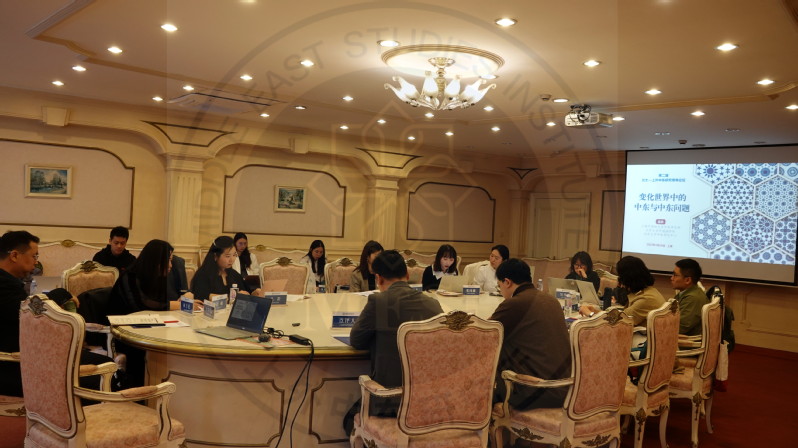
The second sub-forum, New Changes in the Internal and External Affairs of Middle Eastern Countries, was moderated by Professor Lin Fengmin, Deputy Director of the Center for Faculty Development and Professor of Arabic Language at the School of Foreign Languages, Peking University.
Wu Weiqian, a doctoral student of the Middle East Studies Institute of Shanghai International Studies University, spoke on A Study of the Relationship between Church and State in the Construction of the Modern Saudi Arabian State. She argued that the alliance between the Wahhabis and the Saudi monarchy, the differentiation of the sects themselves and the change in the power of church and state since the start of the modernization process in the Third Kingdom of Saudi Arabia reflect the unique modernization path of the Kingdom of Saudi Arabia and its changing political ecology. The relationship between church and state is an important perspective for understanding the modernization process of the relatively stable political Kingdom of Saudi Arabia, and an important dimension for analyzing the unique path of modern state building in Saudi Arabia.
Deng Weilin, a master's student at the School of Foreign Languages, Peking University, titled her presentation Cooperation and Competition between Iran and Pakistan in Afghanistan. She pointed out that since the Afghan Taliban took over power in Afghanistan in August 2021, the political landscape in Afghanistan has undergone significant changes, with the influence of the United States and other Western powers declining in Afghanistan. At the same time, countries in the West and South Asia region have increased their cross-regional linkages, driving a divergent mix of regional power. The game between Iran and Pakistan in Afghanistan will show a strategic competition situation in which cooperation is greater than competition in the short term and competition is expanding in the long term.
Zhu Lin, a doctoral student of the Middle East Studies Institute of Shanghai International Studies University, presented on The History and Evolution of Political and Religious Relations in Oman. Based on a review of the existing research paths on secular relations in Oman, she proposed that the development of secular relations in Oman has complex and contemporary characteristics, and argued that the development of secular relations in Oman has gone through three stages: secular relations during the period of theocracy, competing secular relations during the period of kingship, and secular relations during the construction of the modern nation-state. In the process of constructing the modern Omani nation-state, religion, as a part of Omani political ideology, gradually formed a submissive political culture, thus making the relationship between political power and religion submissive and auxiliary. This relationship constitutes the most important feature of the relationship between church and state in modern Oman.
Fan Fan, a doctoral student at the School of Foreign Languages, Peking University, spoke on The Hijab Issue and its Institutionalization Mechanism in Contemporary Iran. She pointed out that the incongruity between governmental decisions and people's interests, the politicization and de-rightsizing of the hijab constitute the core of the hijab issue in contemporary Iran. Since the late 1990s, the government of the Islamic Republic of Iran has initiated a dual cultural-compulsory mechanism to promote the institutionalization of the hijab based on a series of relevant resolutions. The shortcomings in the design and implementation of this mechanism have led to the failure to institutionalize the hijab, which has instead led to the intensification of the hijab issue and eventually led to a series of political and social conflicts over the hijab in Iran. This has led to a series of political and social conflicts over the hijab in Iran.
Liu Suli, a doctoral student of the Middle East Studies Institute of Shanghai International Studies University, spoke on Israel's Tradition of Science Diplomacy and its Impact. She discussed the reasons why science diplomacy has become a political tradition in Israel and its historical impact on Israeli and international politics, and then analyzed in detail the political attributes of science, the contribution of the field of basic scientific research to diplomacy, the requirements of science diplomacy for the political literacy of scientists, and the unique advantages of science diplomacy.
In the commentary session, Assistant Researcher Wen Shaobiao fromthe Middle East Studies Institute of Shanghai International Studies University commented on the above presentations in terms of research topics, problem awareness, theoretical application, and empirical research, and made specific suggestions on enhancing problem awareness, focusing on research topics, and improving the analytical framework.
The second session on Community Politics and Discourse Politics in the Middle East was moderated by Niu Song, a researcher of the Middle East Studies Institute of Shanghai International Studies University, and four postgraduates spoke in succession.
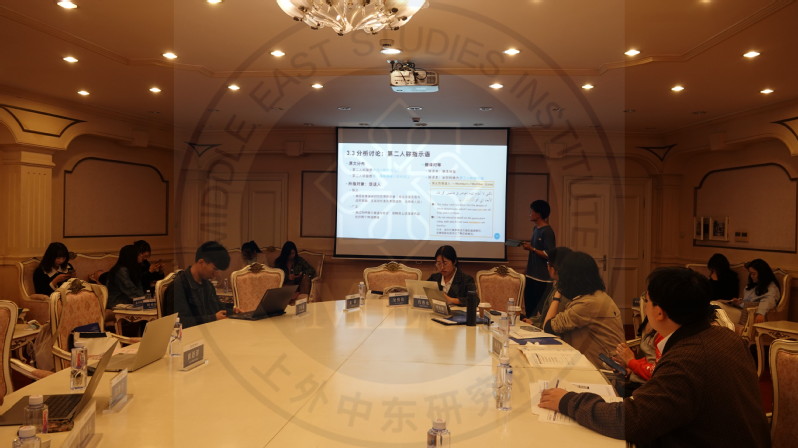
Ding Hengrui, a PhD candidate at the School of Foreign Languages, Peking University, spoke on A Study of the Palestinian Diaspora in Lebanon. Since the 1948 Palestinian Nakba (Nakba Day), Lebanon has hosted a large number of exiled Palestinians. Refugees constitute the bulk of the Palestinian population in Lebanon, and the vast majority of Palestinians in Lebanon have long struggled to integrate into local society and maintain their Palestinian identity. At the same time, the Palestinian diaspora constitutes an important force in the practice of the Palestinian national liberation movement outside the occupied territories. By virtue of their special status, the Palestinian diaspora in Lebanon attracts different political forces in the Middle East, and the Palestinian refugee camps spread throughout Lebanon have become an important platform for the game between the various camps in the region.
Cui Shuyang, a master's student at the School of Foreign Languages, Peking University, presented A Study of the Foreign Translation of the Discourse of Egyptian National Image Construction in the Perspective of Personal Indicators: An Example of the English Translation of President Sisi's Speech at the 70th UN General Assembly. Using the method of critical discourse analysis, he examined the original speech delivered by Egyptian President Sisi at the general debate of the 70th UN General Assembly and the two English translations issued by Egypt and the UN. The Egyptian translation uses first-person indications to actively construct a positive image of Egypt at the domestic, regional and international levels, mainly by shifting the focus, choosing words carefully and creating positions, highlighting potential political intentions such as serving national outreach and seeking legitimacy and international assistance. The joint translation, on the other hand, uses the human indicative to serve the needs of document archiving, maintaining neutrality, and providing information to audiences of different linguistic levels, passively and unconsciously participating in the construction of Egypt's national image.
Xiao Xiuniu, a doctoral student of the Middle East Studies Institute of Shanghai International Studies University, spoke on The Construction of Israeli-Iranian Hostility under Confrontational Discourse Theory: The Political Discourse of the Leaders of the Two Countries as an Example. She argued that the outbreak of the Islamic Revolution in 1979 changed the macro-structure of the previously moderate political discourse between the two countries, after which the two-way hostile discourse between Israel and Iran underwent a transformation from ideological competitor imagery (1979-1991), to the degradation of competitor imagery and the formation of enemy imagery (1991-2005), to full-blown enemy imagery (2005-present). The hostile discourse of the Israeli and Iranian leaders is repeatedly expressed, culminating in a confrontational discourse. The fundamental difference with the enemy in this discursive structure forms and activates the identity of antagonism between the two countries and is the logical basis for the construction of the hostile discourse between Israel and Iran. Although the hostile discourse of the two countries does not fully fit with practice and is somewhat performative and irrational, as the confrontational discourse of the two countries continues, the hostile discourse integrated into daily political life gradually becomes a mechanism that solidifies the conflict and stimulates and promotes the escalation of the outbreak of the conflict between Israel and Iran.
Yan Zening, a master's student at the School of Foreign Languages, Peking University, titled his speech Discourse as a concrete process of practice driving social change - a discourse analysis of the historical significance of the <Agadir Charter>. He pointed out that since the 1960s, the Berber people have been playing a long game with the Arabized ideology of the government, and the 1991 Agadir Charter has become a landmark of the Berber social movement for their linguistic and cultural rights, which is the venue and result of the game between different interest groups in Moroccan society over language resources. The Agadir Charter played an important role in promoting social change in Morocco, which eventually led the Moroccan authorities to amend the constitution in 2011 to grant Amazigh the same status as Arabic as an official language.
In the commentary session, Yuan Lin, lecturer of the Arabic Department of the School of Foreign Languages of Peking University, commented on the above presentations from the perspectives of research, research texts and discourse system, and made specific suggestions on improving the framework design, focusing on information selection and expansion of research fields.
The closing ceremony of the forum was chaired by Assistant Professor Li Haipeng of the Department of Arabic, School of Foreign Languages, Peking University. Professor Wu Bingbing, Chair of the Department of Arabic, School of Foreign Languages, Peking University and Director of the Middle East Research Center, Peking University, and Researcher Niu Song of the Middle East Studies Institute of Shanghai International Studies University, made their concluding remarks.
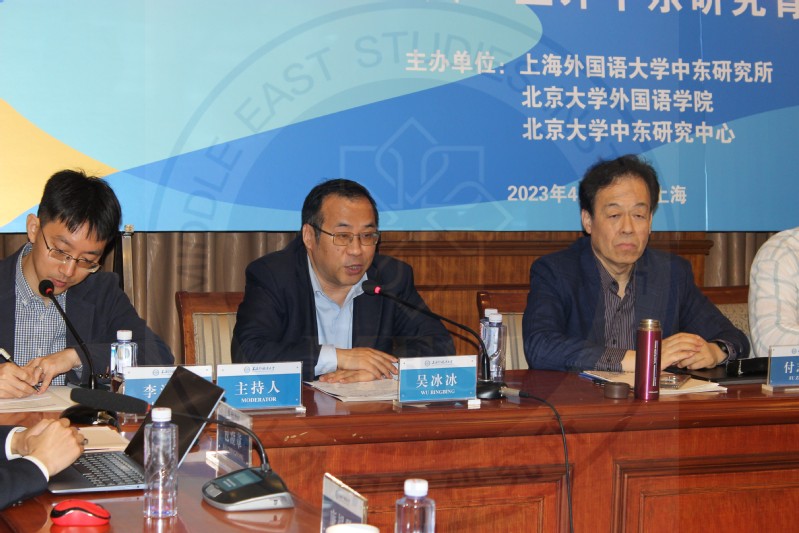
In his concluding speech, Professor Wu Bingbing pointed out that the forum provided a platform for young scholars of Middle East studies from two universities to exchange and learn from each other, emphasizing that academic research is a process of cultivating academic personality, reflecting humanistic care and realizing academic tolerance, and suggesting that young scholars should strive to enhance research autonomy, uphold a truth-seeking attitude, improve the construction of knowledge system, shape independent personality and cultivate critical thinking.
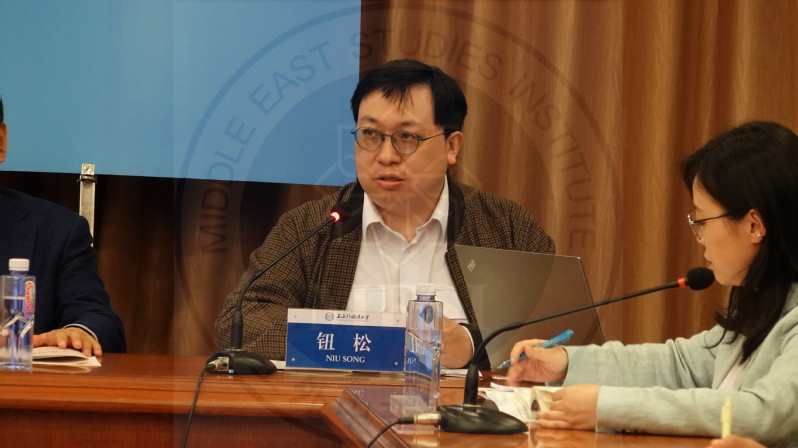
In his concluding remarks, researcher Niu Song pointed out that the theme and topic setting of this forum reflected strong contemporary features and practical significance, and that the century-old changes have put forward new requirements for the theoretical paradigm, knowledge system, and talent training mode of Middle East studies. He encouraged young scholars to innovate research methods, break through the traditional paradigm, update the knowledge system, realize interdisciplinary intersection, and make more contributions to the development of Middle East studies in China.
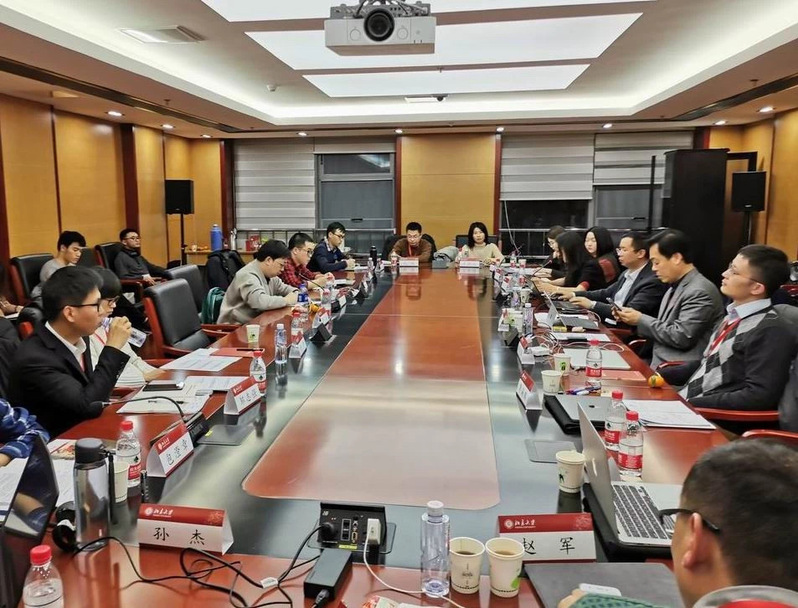
The first Peking University- Shanghai International Studies University Youth Forum and the seminar on Politics and Culture of the Middle East in Times of Change and Transition was held at Peking University on November 29, 2019, as an institutionalized academic platform to promote the construction of an academic community for Middle East studies and to foster new academic talent.